Don’t underestimate the importance of a healthy, positive mindset.
According to one study done by the Harvard T.H. Chan School of Public Health, the link between ‘positivity’ and our well-being may be stronger than we think.
This eight-year-study showed that optimistic women were 30% less likely to die from a long list of major causes of death (cancer, heart disease, stroke, respiratory disease, and infection) than their pessimistic counterparts.
If you’re dealing with something as emotionally draining as a disease such as osteoporosis, a positive outlook can be a vital tool in your toolkit.
It’s just as important to maintain a healthy mental well-being as it is to take care of yourself physically. Your attitude absolutely affects the way you feel physically.
Having a positive outlook doesn’t necessarily mean you never experience negative emotions like anger or sadness. In fact, we need some negative emotions in our life to help us move through difficult situations and respond to them appropriately, according to psychologist and emotional wellness expert, Dr. Barbara L. Fredrickson.
Finding the proper balance of positive and negative can create healthy thought patterns, so you can cope with difficult situations and choices. There are many natural science-backed ways you can use to find your own perfect emotional balance.

The 3-Step Mental Process of Osteoporosis
Learning that you have a serious health condition such as osteoporosis can take a toll on you emotionally as well as physically. If you’re not in the right mindset when dealing with critical life moments, it can negatively affect every aspect of your life from work to family and even social engagements.
But, being diagnosed with this bone disease doesn’t have to be the end-all to your current lifestyle. You can lead a happy, increasingly healthy life with much love and joy, and it’s important to know that you can fully restore the health of your bones, naturally and safely.
Following this three-step process can help you find a natural solution to overcome osteoporosis. Take control of your life and enjoy every minute to the fullest.
Don’t Stuff Your Emotions.
OK, you have osteopenia or osteoporosis. Embrace your feelings. It’s 100% natural to feel stressed and anxious about this. The diagnosis likely caught you off guard, and you probably left the doctor’s office with pamphlet after pamphlet containing information on various drugs and drug treatment options.
These days, Google and the internet can add to your anxiety levels. You’re faced with conflicting information from a variety of different sources- some trustworthy, and some, not so much.
Don’t be too hard on yourself. You’re allowed to be overwhelmed with a wide range of emotions concerning the steps to come. Once you’re able to harness your feelings, you can begin to move past them into solution mode.
Address The Situation
So, you’ve embraced your emotions. Remember, acknowledging your emotions regarding your diagnosis is not the same as accepting it as inevitable or incurable. Now what? First, breathe. Take several, unhurried, deep belly breaths. Get some oxygen to your brain and let your parasympathetic nervous system help you settle. Take your initial gut-reaction away from the equation and tackle your decisions with a freshly-cleared mind.
Think about what it is you really want. A wide variety of natural treatment options for osteoporosis are available from which to choose. Learn more about some of the science-backed osteoporosis treatment options available.
Deciding what’s right for you can be difficult. If needed, talk to those closest to you for help finding a natural remedy for osteoporosis. It is possible to find natural solutions that can help you maintain a healthy lifestyle, heal your bones and protect your overall well-being.
Find Your Solution
It’s crucial you make informed decisions about your health. That means researching science-backed osteoporosis treatment options.
Everyone is unique. What works for one person won’t necessarily be the best option for someone else. Chances are though, if you’re reading this, you’re looking for a natural option to increase your bone density safely.
If you’re looking to reclaim your bone health, AlgaeCal Plus and Strontium Boost are your research-backed bone-building duo. AlgaeCal Plus delivers plant-based calcium with magnesium, vitamins D3, K2, C, boron and all the essential trace minerals. When taken with Strontium Boost, the combination is clinically supported to increase bone density in as little as 6 months – at any age!
[ac_banner name=”bbpboat”]
Once you’ve found the right treatment method for your osteoporosis, you can also refer to some of the methods below to reduce stress and anxiety associated with your diagnosis.
6 Science-Backed Ways to Overcome Stress and Anxiety from Osteoporosis
While solving physical problems associated with osteoporosis is important, it’s equally important to treat your mental well-being. Feed both your mind and body with some of the following science-backed solutions…
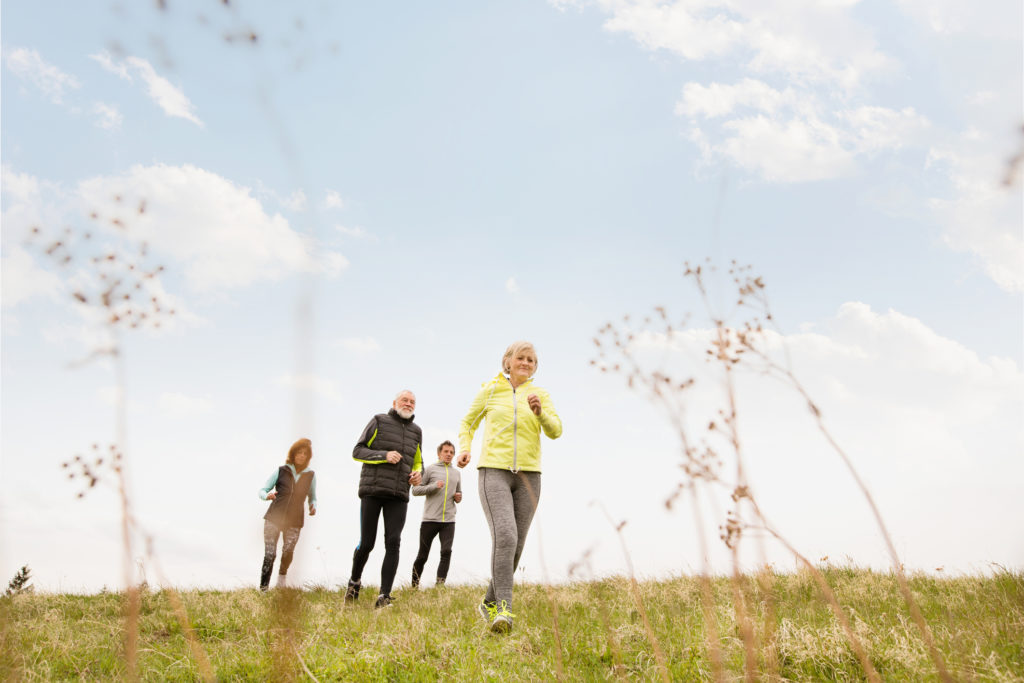
Exercise
It’s widely known that exercise is associated with improved physical health in general. But, did you know that exercise is also vital for improving your mental health? Let’s take a closer look at how exercise can be used to reduce anxiety and improve your mood.
When you exercise, the plasma concentration of endorphins becomes higher in number. Endorphins are “feel good” compounds that our bodies produce in response to exercise, giving you ‘exercise-induced euphoria,’ and lessening your perception of fatigue and pain.
Certain exercises can also help prevent further bone loss while you’re working to rebuild bone mass through supplementation and lifestyle changes. Weight-bearing exercises, for example, force your body to work against gravity and are ideal for building bone.
Some weight-bearing exercises include:
- Walking
- Jogging
- Hiking
- Climbing Stairs
- Tennis
- Dancing
- Pilates
- Barre
- Yoga
Have you ever wondered why exercise classes like yoga, barre, and pilates are centered around music? Listening to music when working out helps you move to the beat or flow of the music, but it also has stress-relieving effects.
A randomized study was done to determine the benefits of music on the human body. The study showed that listening to music impacted the psychobiological stress system (the stress system of both the mind and body). Plus, participants who heard music beforehand showed a faster recovery time towards stressors compared to participants who did not.
Let’s take a look at a few of the exercises you can do to combat stress and anxiety.
- Tai Chi: This ancient Chinese martial art is a full mind and body practice. It focuses greatly on relaxation and breathing techniques. Due to the low-intensity level of tai chi and its ability to strengthen bones, it’s ideal for those with osteoporosis. Learn more about the benefits of tai chi for osteoporosis.
- Yoga: Another non-pharmacological method for treating anxiety and stress is practicing yoga. Yoga is thought to improve mental and physical health by regulating your hypothalamic pituitary adrenal (HPA) axis and sympathetic nervous system (SNS) activities. Find out more about how yoga can help you build better bones.

Meditation/ Mindfulness
Meditation is the practice of training your mind to develop concentration, emotional positivity and clarity. Mindfulness on the other hand, is the process of bringing one’s attention to experiences happening in the present moment.
Taking a short amount of time out of your daily routine to practice these techniques can add to your overall quality of life.
A randomized, controlled study was done to determine the possibilities of mindfulness meditation as a therapeutic strategy for anxiety disorders. The results of the study indicated that, when done correctly, MBSR (mindfulness-based stress reduction) improved study participants’ ability to react and cope with stressful challenges.
According to the Harvard Health Blog, meditation is also linked to lower mental stress. Meditation focuses on being mindful as well as breathing techniques (more on that below). When practiced regularly, meditation allows your brain to develop new pathways that can help with some of the following symptoms associated with high anxiety levels:
- Hard-to-Control Worries
- Poor Sleep
- Irritability
The UCLA Mindful Awareness Research Center has compiled a list of guided meditations you can conveniently practice wherever you may be. They range from 3 to 19-minute meditations and include English and Spanish versions. The “Loving Kindness” Meditation is an AlgaeCal favorite. Let us know which one(s) you like in the comments below!
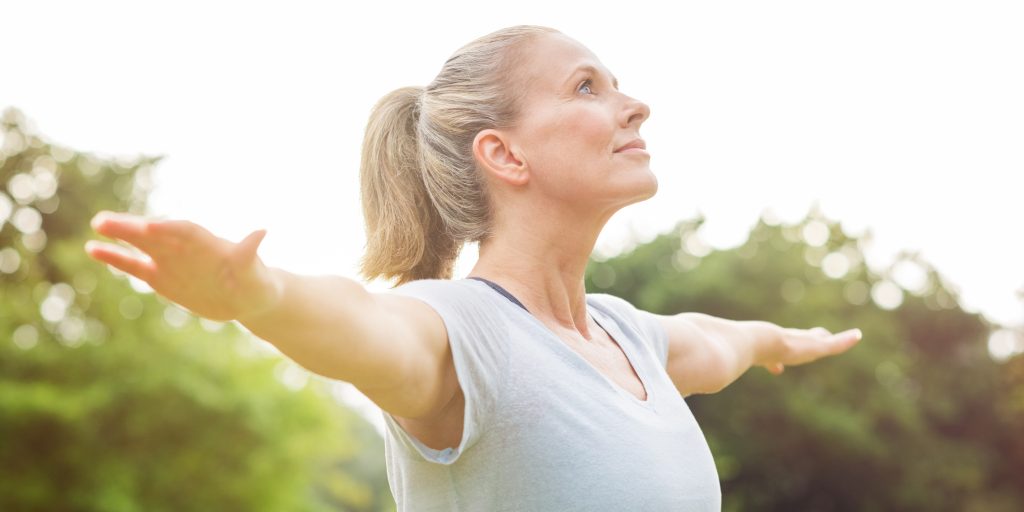
Breathing
Mindfulness and breathing go hand in hand and can be used together or on their own to relieve anxiety. Because they are so similar, you can choose the one that fits best with your lifestyle.
Evidence suggests that mindful breathing exercises really work. Participants in one study were divided into two groups and were shown slides with negative images. One group was asked to complete a 15-minute breathing exercise. The other was not. Those who did the focused breathing reported less negative emotion in response to the slides. Results suggest controlled breathing has the ability to help regulate emotion.
Breathing exercises may seem somewhat silly to those who haven’t tried them. But, chances are you’ve probably benefited from the power of controlled breathing without even knowing you were doing it.
Think about it.
Have you ever, in a moment of frustration, told yourself to stop and take a deep breath? That’s controlled breathing! Simple right?
Berkeley University gives several tips on how to properly practice mindful breathing exercises to ease stress and anxiety.
- Try to practice mindful breathing at least 15 minutes a day. If the thought of finding 15 spare minutes adds to your stress level, start with 5 or even 3.
- Find a position (sitting or lying down) that helps you feel calm and relaxed.
- Take it one breath at a time. Notice how each breath feels as you inhale and exhale.
- If you notice your mind wandering, simply redirect your thoughts to your breathing.
Learn more helpful mindful breathing techniques here. Whether you commit to a daily practice (which is ideal) or a couple of times a week, breathing exercises will benefit your mental health.
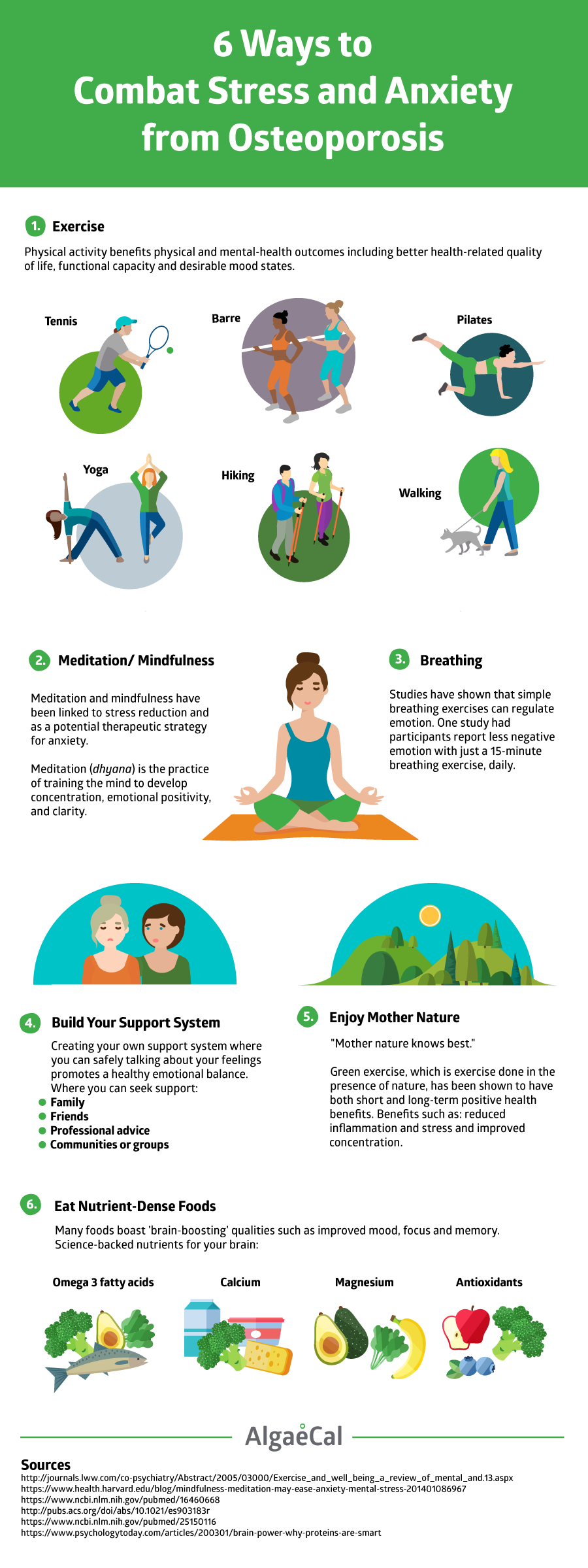
[embed_infographic title=”6 Ways to Combat Stress and Anxiety from Osteoporosis” alt=”6 Ways to Combat Stress and Anxiety from Osteoporosis infographic” src=”algaecal.com/wp-content/uploads/emotional-struggle.png”]
Build Your Support System
Don’t be afraid to seek outside help to cope with a diagnosis such as osteoporosis. Expressing pain, distress or sadness allows you to let out the hurt while opening your heart to more positive feelings, according to Barton Goldsmith, Ph.D. and psychotherapist. Talking about your feelings promotes a healthy emotional balance.
Of course, friends and family are a great support system. However, it may be difficult for them to understand exactly what you’re going through, especially if they haven’t gone through it themselves.
For some, it can be hard to speak openly about difficult subjects with those closest to them. You may feel that you’re adding some sort of burden to them when talking about hard to discuss topics-although, they’d likely disagree.
If you’re feeling overwhelmed and want to talk to someone outside your immediate circle, there are many options available to you.
- Seek professional advice: A professional therapist will listen to your feelings and provide you with ways to change your thought patterns for the better. You’ll also receive coping mechanisms specifically tailored for you.
- Find a community of like-minded people: Whether it be an in-person support group or an online forum, talking to someone with similar problems or goals can be encouraging.
Feel free to connect with others going through the same thing by joining our Facebook group. Or, here on our AlgaeCal blog. We always encourage comments from our readers. Share your story below. We’d love to hear your story and connect you with others in our community.
You can also call in and speak to our Bone Health Consultants about your current bone health regimen or any questions you may have. You can call 1-800-820-0184. We are open from:
Monday–Friday: 6:00am to 4:00pm (PST)
Saturday: 7:00am to 5:00pm (PST)
Sunday: 7:00am to 5:00pm (PST)
Use a combination of ways to get the support you need to work through tough situations. Remember, providing support for your mind is just as important as healing your physical self.

Spend Time with Nature
One of the best ways to really appreciate what you have is to enjoy Mother Nature — the outdoors. The beauty of nature has a way of easing the mind. Whether you’re upset, depressed or simply have a headache, tuning into the sounds, smells, and beauty of nature can have a positive effect.
Walking or hiking through nature can be an uplifting experience. And, as we’ve learned, both are weight-bearing exercises ideal for those who suffer from osteoporosis.
Green exercise (done in the presence of nature) is known to have positive short and long-term health benefits. In fact, research has shown that just 5-minutes of green exercise a day can improve self-esteem and mood.
Still not convinced? Take a look at a few other ways Mother Nature can be beneficial to your overall well-being.
- Provides stress relief: A randomized study sent a group of students to an evergreen forest for a 2-day period and another group to a city area to assess the short-term effects of “forest bathing.” After only 2-days, subjects of the study showed reduced levels of oxidative stress when exposed to nature-settings.
- Reduces inflammation: Another controlled study placed 12 elderly hypertension sufferers in an evergreen forest setting and 12 in an urban setting. The patients in a forest setting exhibited a reduction in blood pressure and hypertension-related inflammation. Those in the forest settings also showed a lower profile of negative mood states after the 7-day/7-night period.
- Improves concentration: A single-blind controlled trial was done to determine the impact environments had on the attention of children with ADHD over 20-minute periods. The children with ADHD showed improved concentration and mental focus when exposed to ’20-minute doses of nature’ through walks in parks as opposed to city walks.
So, next time you’re upset, turn off the phone and go for an uninterrupted walk or hike. You may just find yourself calmer emotionally and physically healthier.
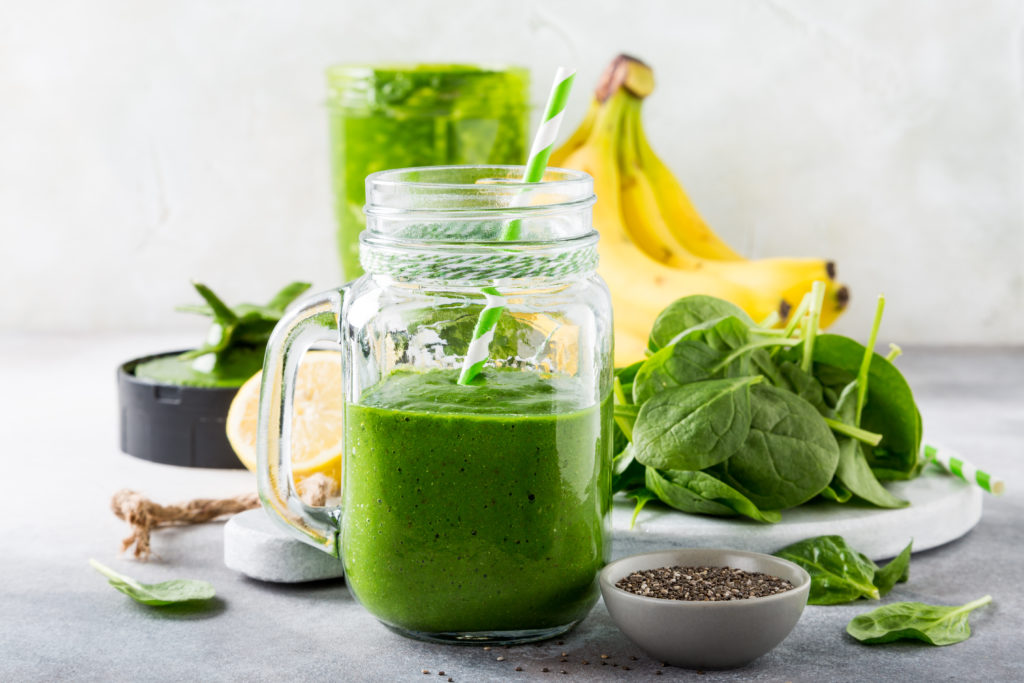
Eat Nutrient-Dense Foods
Research has shown that your mood can affect the foods you eat. That’s right. Happy, positive people make healthier food choices.
But it can work the other way around too! Choosing nutrient-dense foods can provide natural stress relief.
- Pick foods with healthy fats like omega-3 fatty acids: Foods such as wild-caught salmon and free range organic eggs are packed with good-for-you omega-3 fats. Omega-3s have anti-inflammatory properties that may also help counteract stress hormones. Other healthy fats like those found in avocado, organically grown walnuts and other nuts and seeds, and extra virgin organic olive oil can support brain health as well. Organic here is key! The toxins in non-organic foods will negate the beneficial effects. In eggs and fish, the omega-6 content wipes out the benefits of the omega-3s present, for example.
- Calcium and magnesium-rich foods are good choices, too: Calcium and magnesium have many functions in the body, including relaxing muscles, helping you sleep and relieving headaches. Both calcium and magnesium also play crucial roles in bone-health making them extra important for those with osteoporosis. AlgaeCal Plus contains plant-based calcium, plus magnesium, vitamins D3, K2, C, boron and all the essential trace minerals for bone health.
- Antioxidant-rich foods like blueberries can help improve your mood: Antioxidants and phytonutrients in berries can help your body respond to stress and fight stress-related free radicals. Research has shown that people who eat blueberries experience a boost in natural killer cells (cells that kill tumor or infected cells without harming healthy cells). Even a glass of red wine with dinner will deliver the potent anti-aging phytonutrient, resveratrol, which improves digestion and promotes relaxation.
- Protein-rich foods are mood and brain boosters: Protein directly affects your brain performance because it provides the amino acids that make up your neurotransmitters. These are the compounds our brain cells secrete that transmit signals from one brain cell to another, regulating the signals sent from the brain to the nervous system throughout the body. One example here is the neurotransmitter, serotonin. When you don’t get enough protein, your gut can’t produce enough serotonin, which is your ‘feel good’ hormone. Fun fact: Almost all serotonin (about ~90%) is produced and found in the intestine. The remaining ~10% is made in the central nervous system. For more on how calcium and protein work together, read the blog: Protein and Bone Health.
Emotional Wellbeing and Your Bones
Sometimes it’s hard to find the positive in a recent diagnosis or a difficult situation, but a diagnosis of osteopenia or osteoporosis can be seen as a “wake-up and take care of yourself” call. Use your feelings of concern as fuel that empowers you to make positive life changes and create a plan of action to restore the health of your bones. Your diagnosis can be the beginning of the healthiest, strongest, happiest years of your life.
Use the above science-backed resources to help you deal with stress and anxiety, and improve your overall mental health.
Know that you’re not alone. Join the AlgaeCal community by commenting below, or like the AlgaeCal Facebook page. Share your story and help others, who, like you, are facing the same challenges, and emerge stronger, wiser and healthier than you’ve ever been before.
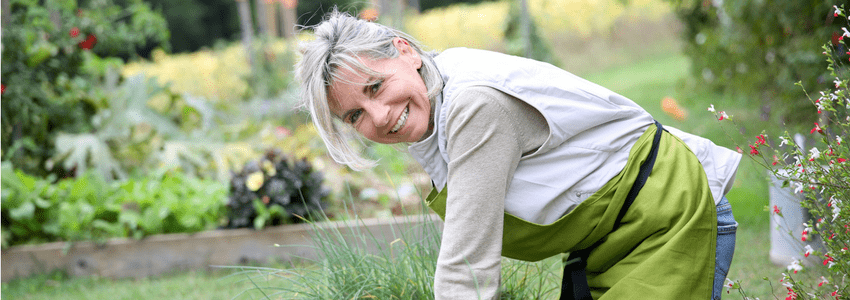




Article Comments